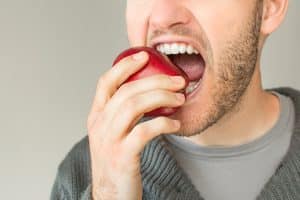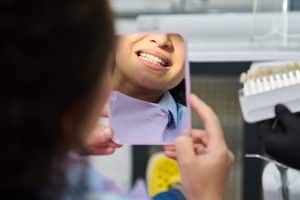News
Eating After Dental Implants: 5 Dos And Don’ts
Dental implants have transformed the field of dentistry, offering a natural-looking and functional replacement for people who have lost a tooth due to injury or decay. Besides offering a natural look, they’re designed to last for many years. But since getting dental implants is a significant investment, you must take care of them properly to ensure their longevity. One crucial aspect of caring for dental implants is choosing the right foods to eat.
Eating after dental implant surgery is a topic of great importance for individuals seeking a long-lasting solution to missing teeth. Like any other surgery, your dental implants will take some time to heal. Thus, it’s crucial to understand the dos and don’ts when eating after dental implant placement to ensure successful healing and the longevity of your implants.
Keep reading and explore the essential dos and don’ts to remember when eating after dental implant surgery, ensuring you can enjoy a healthy and nourishing diet while maximizing the benefits of your dental implants.
The Dos:
- Stick to Soft Or Liquid Foods
Immediately after the dental implants in Lincoln Park procedure, it’s crucial to stick to soft foods. Soft foods are gentle on the surgical site, minimizing the risk of irritation or injury. Opt for options such as mashed potatoes, yogurt, soups, scrambled eggs, and smoothies. These foods are not only easy to chew but also provide essential nutrients for healing.
The length of days or weeks you’ll need to stick to soft or liquid foods generally depends on the type of dental implant placement you’ve had. For example, if you’ve gotten the all-on-4 dental implants, you’ll be required to stick to a soft or liquid diet for up to two weeks after the surgery. The all-on-4 dental implants may have a longer healing time and process than other types of implants, but it’s considered among the most effective oral surgeries today.
- Maintain A Balanced Diet
While it’s important to focus on soft foods initially, it’s equally crucial to maintain a balanced diet. Incorporate nutrient-rich foods like fruits, vegetables, lean proteins, and whole grains into your meals. A well-balanced diet promotes healing and strengthens your immune system, aiding in the recovery process.
- Drink Lots Of Fluids
Proper hydration is vital for your overall health, including oral health. Hydration promotes saliva production, which aids in digestion and keeps your mouth lubricated. It also helps flush out food particles and bacteria, reducing the risk of infection on your dental implants.
- Practice Good Oral Hygiene
Maintaining proper oral hygiene and dental care are crucial after dental implant surgery. Follow your dentist’s hygiene instructions, ensuring you don’t disturb the surgical site. Use a soft-bristled toothbrush and mild, non-alcoholic mouthwash recommended by your dentist. Good oral hygiene prevents infection and promotes healing.
- Gradually Introduce Solid Foods
As your healing progresses, you can gradually introduce solid foods back into your diet. Start with small, easily chewable portions and slowly increase the texture and hardness of the foods you consume. This gradual transition allows your mouth to adapt and reduces discomfort.
Furthermore, when slowly incorporating more solid foods into your diet, be mindful of your chewing. Avoid using the implant as a fulcrum when biting down on hard foods. Instead, distribute the food to other parts of your mouth and chew slowly.
The Don’ts:
- Eat Hard and Crunchy Foods
During the initial healing phase, it’s essential to avoid hard and crunchy foods that can exert excessive pressure on the surgical site. Foods like nuts, popcorn, chips, and hard candies can potentially damage the implant or irritate the gums, delaying your dental implants’ healing process. So, as much as possible, steer clear of these foods until your dentist gives you the green light.
- Consume Sticky Foods
Besides hard foods, sticky foods like caramel, taffy, and chewing gum can be problematic for dental implants. They can adhere to the implant or restoration, leading to instability or even damage. To avoid any complications, it’s best to avoid sticky foods altogether.
- Eat Spicy and Acidic Foods
Spicy and acidic foods may cause discomfort and irritation, especially if you have sensitive gums after dental implant surgery. Acidic foods (e.g., citrus fruits, tomatoes) can also temporarily weaken the enamel of your natural teeth. Thus, minimize the consumption of spicy and acidic foods until you have fully recovered.
- Smoke or Use Tobacco Products
Smoking and using tobacco products can significantly hinder healing and increase the risk of complications after dental implant surgery. Tobacco use restricts blood flow, impairs the immune system, and reduces the success rate of dental implants. It’s crucial to refrain from smoking or using any tobacco products during the recovery period, or better yet, permanently. Remember, smoking or using tobacco products can also be detrimental to your oral health.
- Drink Alcohol and Carbonated Beverages
Alcohol and carbonated beverages should be avoided after dental implant surgery. These drinks can irritate the surgical site, delay healing, and increase the risk of complications. Stick to water and other non-alcoholic, non-carbonated beverages for optimal recovery.
Wrap Up
Proper eating habits are crucial for a successful recovery after dental implant surgery. Following the dos and don’ts mentioned in this article will help ensure a smooth healing process and promote the longevity of your dental implants. At the same time, you can reap the benefits of dental implants for many years to come and maintain healthy teeth and gums. For any concerns, don’t hesitate to consult your dentist for personalized advice tailored to your specific situation.


























